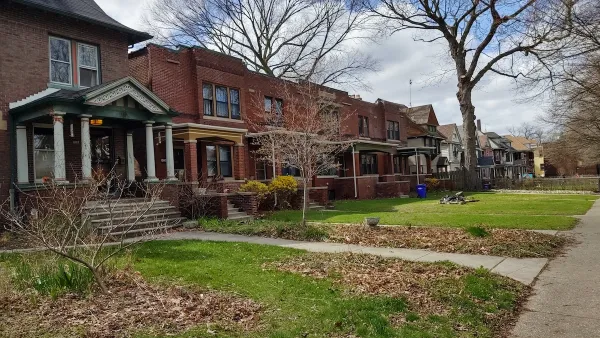Planners and citizens in Detroit are wrapping up a year's worth of research and community engagement before drafting an urban livestock ordinance.
Christine Ferretti reports on the debate in Detroit over an ordinance expected to appear before the City Council in early 2016 that would allow residents to keep livestock, like sheep, honeybees, chickens, and other animals, in urban areas.
"An interest in urban livestock has been growing in Detroit in recent years, but some are worried about health implications, zoning allowances, animal care standards and oversight," according to Ferretti. Following the interest, the city convened an urban livestock working group a year ago "to study local and national policies as well as zoning, animal control, regulation and care strategies for Detroit."
Now a proposed ordinance, "expected to address permitting, euthanasia practices, noise and odor control, waste management and sheltering," should be ready for a hearing in front of the city's Planning Commission by the beginning of next year and the City Council in February or March. Ferretti also reports that the "ordinance wouldn’t allow livestock to be kept as companion animals, like dogs and cats. Rather, keeping livestock would be classified as an accessory activity for grazing on vacant lots and producing eggs, meat, milk and honey."
The article includes more details about the types of animal husbandry that would be allowed under the new ordinance, what it takes to maintain livestock in an urban setting, and voices from either side of the political debate leading up the City Council decision.
FULL STORY: Farm animals in Detroit spawn concerns

Maui's Vacation Rental Debate Turns Ugly
Verbal attacks, misinformation campaigns and fistfights plague a high-stakes debate to convert thousands of vacation rentals into long-term housing.

Planetizen Federal Action Tracker
A weekly monitor of how Trump’s orders and actions are impacting planners and planning in America.

In Urban Planning, AI Prompting Could be the New Design Thinking
Creativity has long been key to great urban design. What if we see AI as our new creative partner?

King County Supportive Housing Program Offers Hope for Unhoused Residents
The county is taking a ‘Housing First’ approach that prioritizes getting people into housing, then offering wraparound supportive services.

Researchers Use AI to Get Clearer Picture of US Housing
Analysts are using artificial intelligence to supercharge their research by allowing them to comb through data faster. Though these AI tools can be error prone, they save time and housing researchers are optimistic about the future.

Making Shared Micromobility More Inclusive
Cities and shared mobility system operators can do more to include people with disabilities in planning and operations, per a new report.
Urban Design for Planners 1: Software Tools
This six-course series explores essential urban design concepts using open source software and equips planners with the tools they need to participate fully in the urban design process.
Planning for Universal Design
Learn the tools for implementing Universal Design in planning regulations.
planning NEXT
Appalachian Highlands Housing Partners
Mpact (founded as Rail~Volution)
City of Camden Redevelopment Agency
City of Astoria
City of Portland
City of Laramie





























